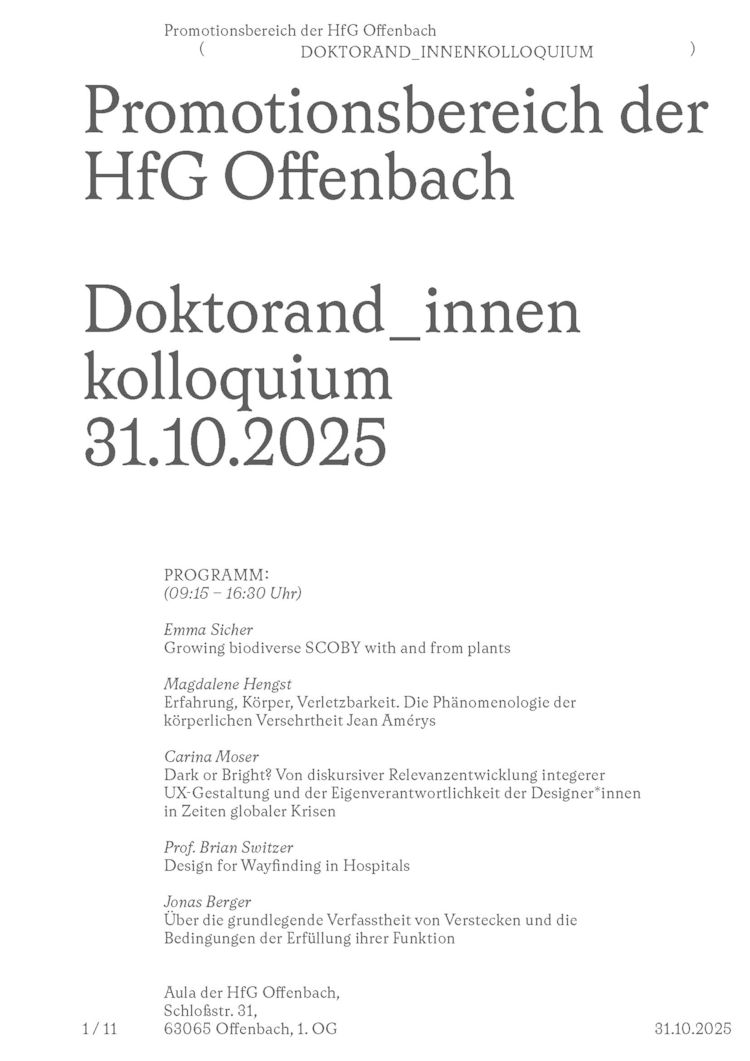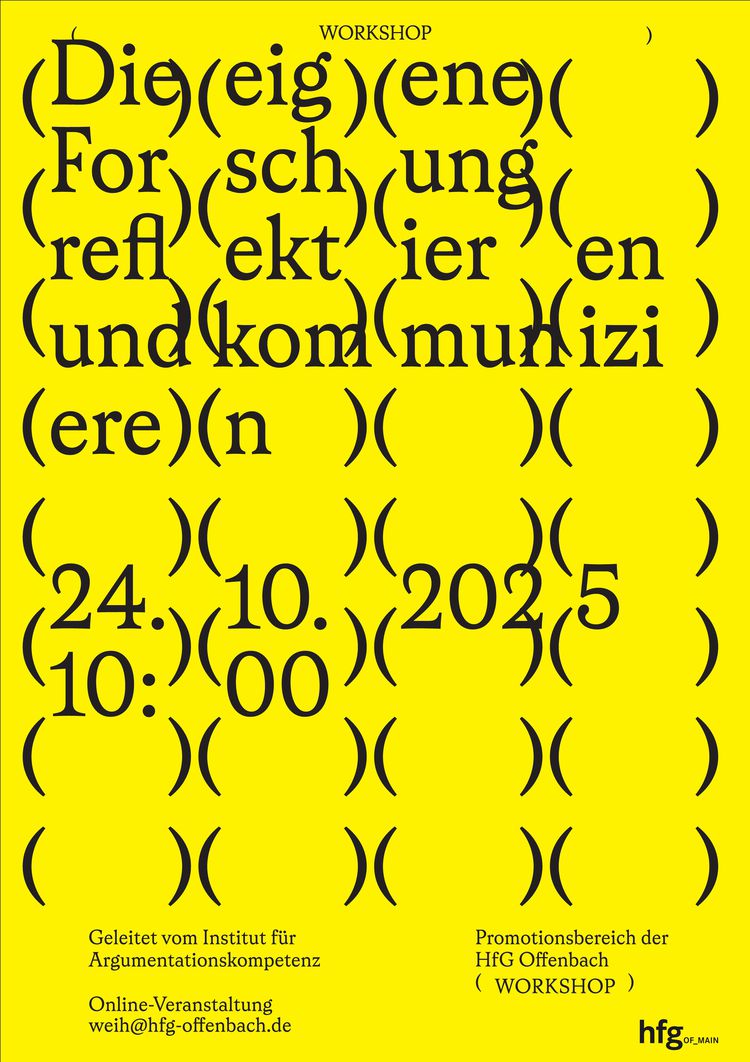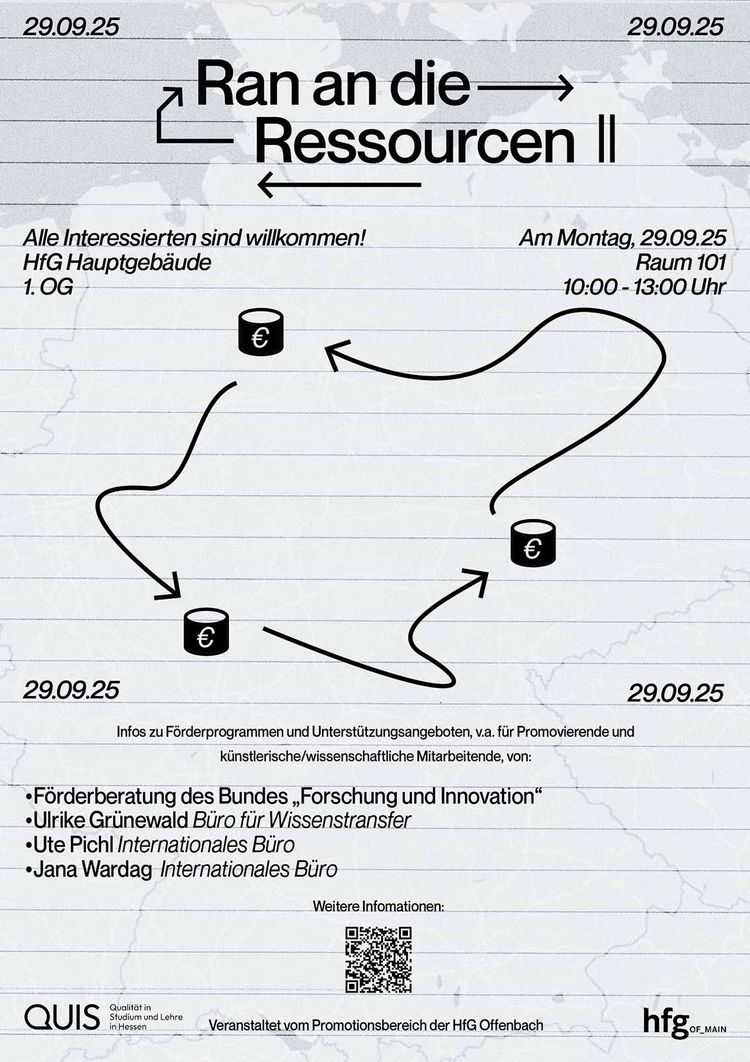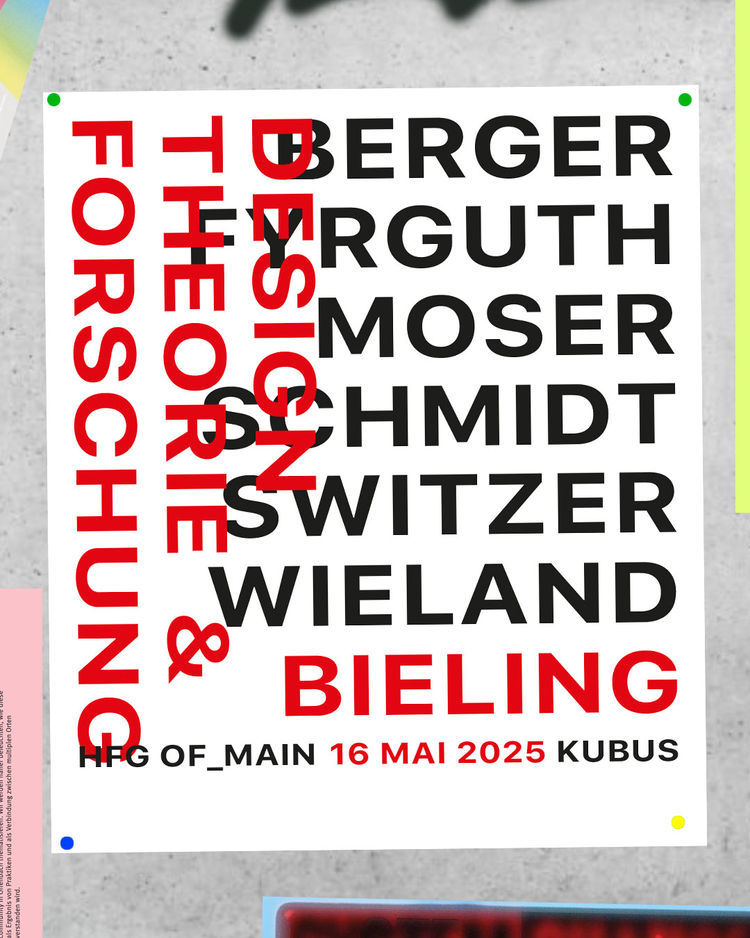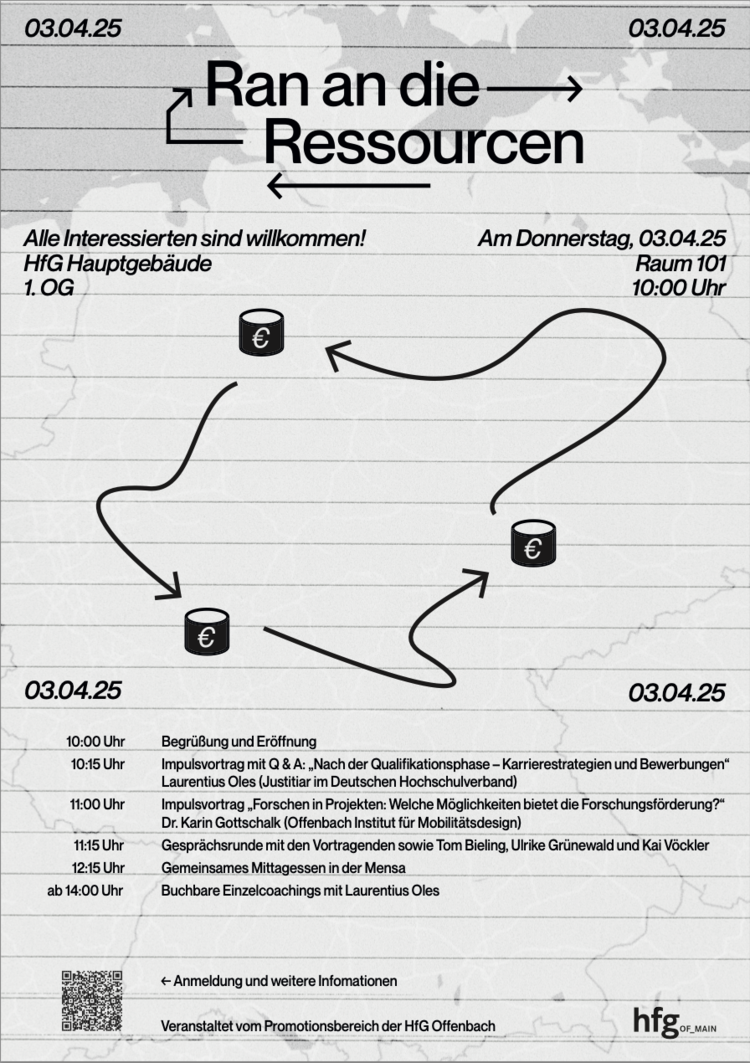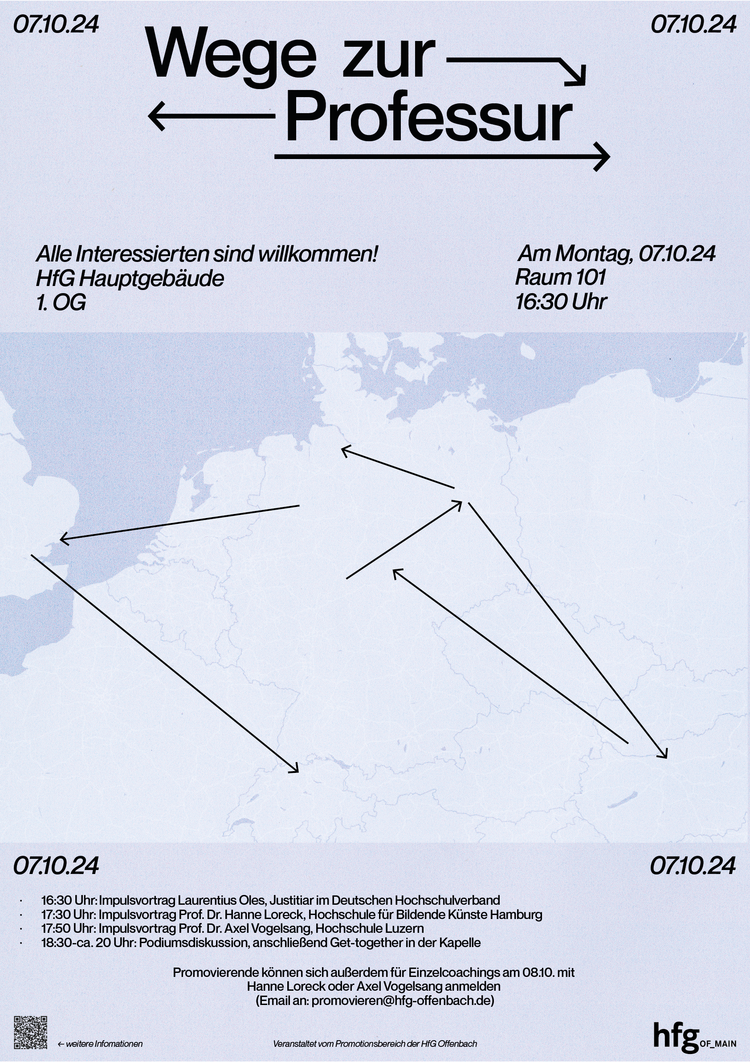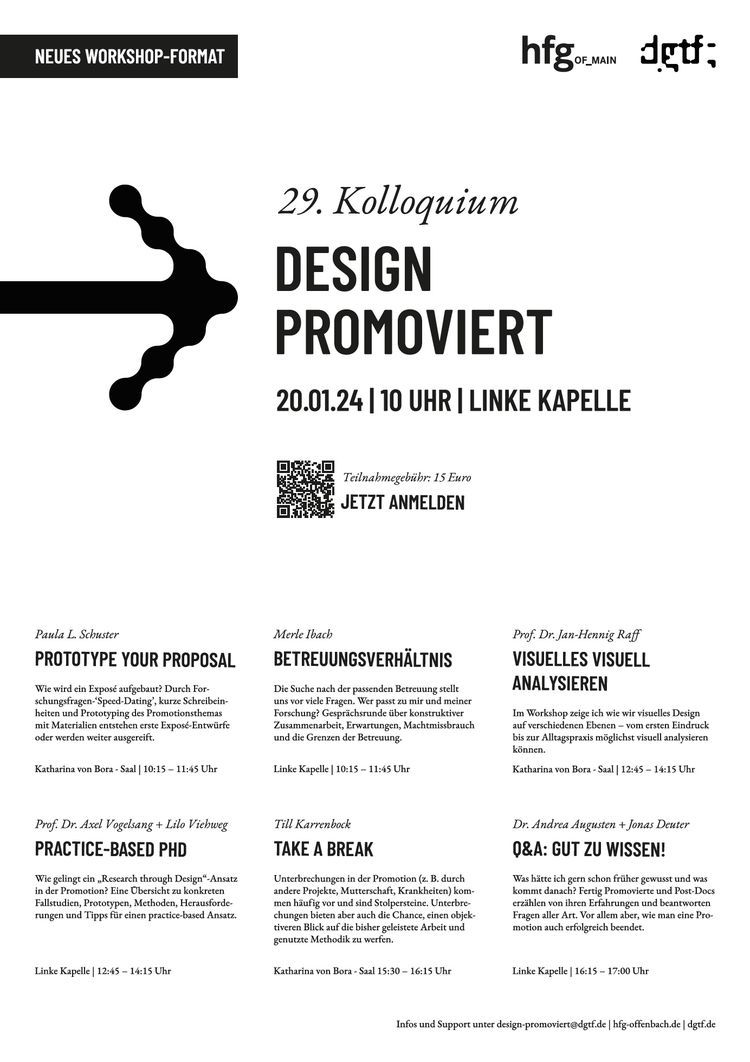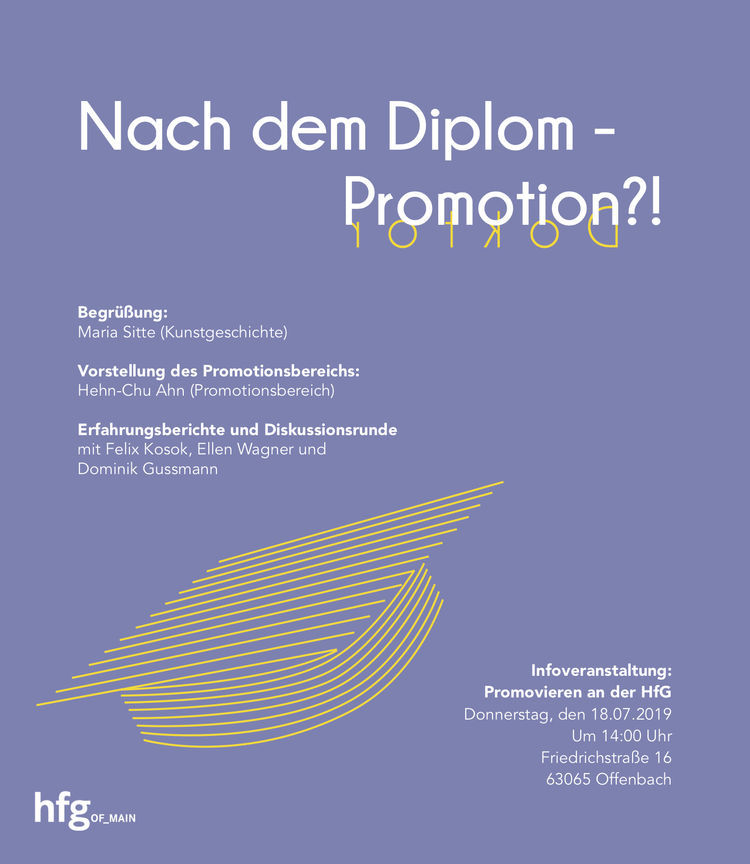Doctorate
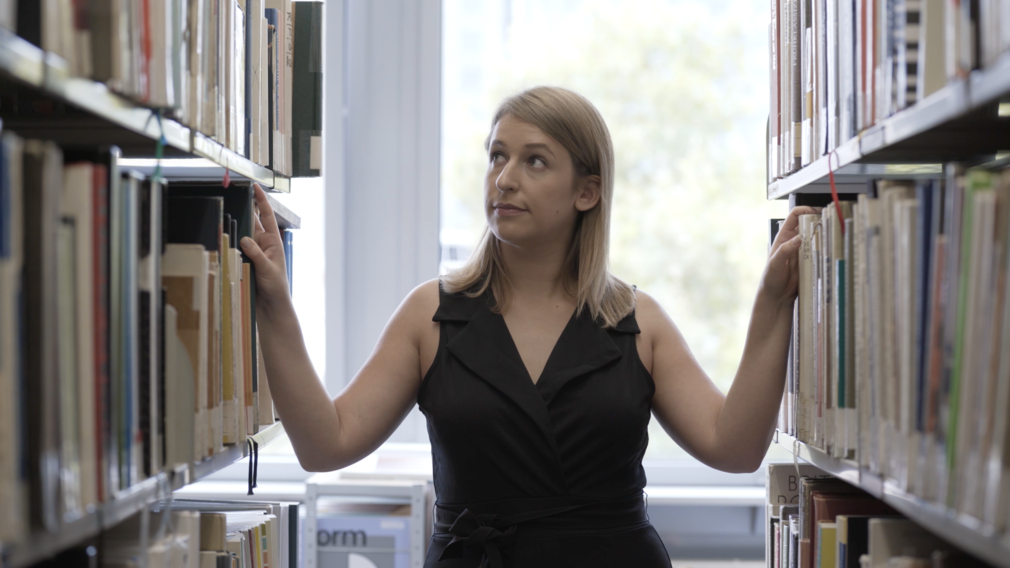
PhD at the HfG
Portrait about Pia Scharf
Film und Music: Daniel Herzog
Why embark on a doctorate at an arts university?
In addition to university research on the arts, there is also a research program that develops in closer exchange with the arts. Here creative, artistic and design strategies, corresponding ideas and discoveries are not only interpreted, but within a meshwork of artistic-creative practice and scientific reflection they are themselves part of the research. Addressing both forms of knowledge has the potential to generate productive new insights.
This is why we offer HfG Offenbach graduates of art, design, media studies or related sciences the option to obtain a Doctor of Philosophy in a model that merges science with art. There are two main subject areas:
Art and Media Studies
Design Studies
HfG Offenbach
As an arts and design university of the State of Hessen, HfG Offenbach teaches some 600 students in the two departments Art and Design. Studying at HfG Offenbach allows students to combine different artistic and creative subjects. Moreover, a comparison of art universities reveals an unusually high proportion of theoretical study.
Combination of science/theory and art/design
The close interlinking of scientific-theoretical and artistic-creative spheres at HfG Offenbach is also reflected in the doctoral degree. The research projects doctoral students tackle consist of a scientific part (two-thirds) and an artistic-creative part. These two parts are not separate, but enter into a complementary relationship with each other. Consequently, the research-based structure of the artistic-creative part and the artistic-creative inspiration of the theoretical work become evident.
In keeping with two-thirds/one-third division, doctoral students are supervised by two professors from scientific/theoretical fields of teaching and one professor from the artistic-creative fields of teaching.Departing from the 50/50 models, HfG Offenbach acts on the premise that a focus on science and research work is indispensable and adopts a two-thirds/one-third model. This is the only way that students have good prospects of obtaining the skills needed for fields of work at universities, art universities, or in the curatorial or journalistic fields.
At HfG Offenbach there is the possibility to choose between two doctoral regulations. If the research projects of the doctoral students consist of two-thirds scientific work and one-third an artistic-creative project (Offenbacher Model) the 'Allgemeine Promotionsordnung' (A-PO) apply. For a purely theoretical dissertation project, the 'Theoriepromotionsordnung (T-PO) apply.
Doctoral studies at HfG Offenbach
- Doctoral colloquiums: on a regular basis
-
The possibility of participating in and using the seminars offered by HfG
- Studio and library study areas: at HfG Offenbach for doctoral students (depends on availability)
Study requirements
In order to be accepted as a doctoral student candidates must generally have completed studies and gained either a Diplom, Magister Artium, Master of Arts or first degree in a scientific or artistic-creative course of studies at a university or art university.
Selected candidates must present their doctoral project to the doctoral committee at HfG Offenbach.
Positions for doctoral students
The university has set up three (Art) and two (Design) part-time research assistant posts, each of which is to be filled for three years by doctoral students at HfG Offenbach.

Application process for doctoral studies
Application documents
- Curriculum Vitae
- if applicable, list of publications
- indication of language skills
- copies of all relevant qualifications
- if applicable, artistic/creative portfolio
and an approx. ten-page research outline containing a
- brief explanation why the Offenbach Ph.D. model is especially appropriate for your particular project
- detailed project description (approx. 7 pages, common formatting)
- study plan (approx. 0,5 page)
- bibliography on the research topic (approx. 2 pages)
Questions
promovieren@hfg-offenbach.de
We would ask you to understand that we can only accept application documents in a digital format (the application link follows at the beginning of each semester).
The next application deadline is in May, 2026.
Doctoral Programme
Chair promotions committee
Contact
Riccarda Weih
Research Assistant
T +49 (0)69.800 59-296
Location
Kubus
Berliner Straße 75, 3OG
Questions
promovieren@hfg-offenbach.de
Art and Media Studies
In keeping with the four theoretical subjects of the Department of Art relevant to the doctoral degree
- History of Art
- Philosophy/Aesthetics
- Sociology/Media Theory
- Theory of Perception
The term »Art and Media Studies« covers various options. For example, the scientific part of the dissertation can both concentrate on the subject areas and methods of just one of the subjects listed above (see the description of these subjects) and combine these subjects; ultimately it is possible to combine them with one of the two scientific/theoretical subjects of the Department of Design.
However, in keeping both with the context of an art university and with the special fusion of science/theory and artistic-creative practice in line with the Offenbach Model, the focus is decidedly on the Modern Age through to the present day, and the spectrum of subjects involved would suggest systematic and interdisciplinary issues. Moreover, as students are required to combine them with one of the artistic-creative subjects from Visual Communication, research topics also tend to reflect the types of arts and media taught in Offenbach.
»Art and Media Studies« questions the reasons and motives of the more recent development of art and media production, their typologies, ways of dealing with them, social functions, dependencies and repercussions of more recent arts and media, and manners of perception in terms of both physiology/psychology and cultural theory/philosophy. Crossovers between free artistic work and applied design can be examined.
The specific meshing of theory and design after the Offenbach Model can also include transformations from the merely analytical recording of trends to initiating and helping shape developments with a promising future – say, in the framework of creative experimentation.
Design studies
A doctoral degree in Design Studies aims at researching and expanding design theory and history, aesthetics and theory of perception, as well as cultural and technical theories. The focus of research is on the area of product language and product semantics. In particular, it encompasses research relevant to design in the field of aesthetics and semiotics (semantics and symbolism). In addition, how users handle products is proving to be an increasingly important field of research. Meaning develops both on a purely symbolic level and in everyday use. As such, interaction between people and objects represents a further field of research that is to be emphasized at HfG Offenbach.
Focusing on these research areas not only promises new insights into the constituent field of design studies, but also has repercussions on design education. This effectively links onto insights and previous research achieved at the university: In the 1980s an Offenbach approach to product language was developed, which has since attained great international renown and receives significant attention from the design research community
While internationally the area of design research has already been institutionalized for some 20 years (university institutes, specialist congresses, expert associations), the process of establishing design research in Germany has only just begun. There is a growing need for a more scientific approach to design given that it has become ever more important in the context of more recent cultural, economic, social and technical developments. And this fact is being increasingly emphasized both by politicians and the business world, as well as by those training to become designers at universities and art academies.
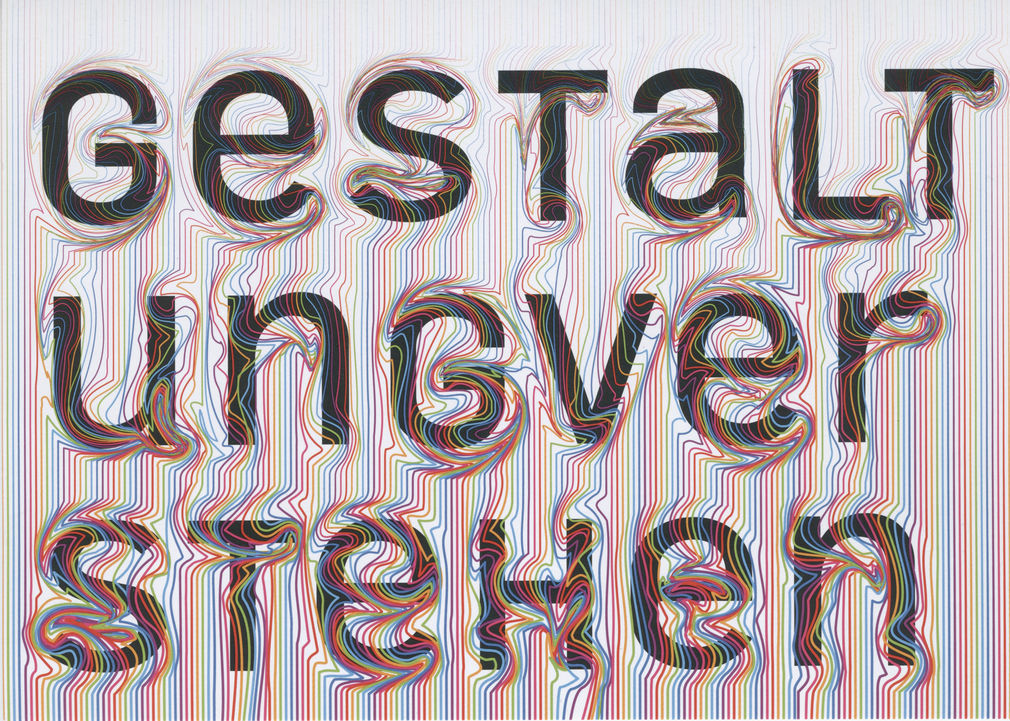
Dissertation themes
Art
- Manuel Ahnemüller
The plastic bag A designed and creative everyday object - A cultural-scientific and media-theoretical investigation of the plastic bag in Volkmar Schnöke's collection
- Helene Deutsch
On humour in contemporary art
- Thomas Dierkes
Rationality and destruction
- Ornella Fieres
The occult digital
- Michaela Filla-Raquin
bilderSTURM
- Nils Fock
Contestation. Negative Aesthetics after Georges Bataille
- Ulrich Gebert
Other-wordly things
- Dominik Gussmann
The poetry of translation
- Falk Haberkorn
An experiment on the gesture of photographing
- Julia Hainz
Aesthetic of fluidity
- Magdalena Hengst
Experience, body, vulnerability. The phenomenology of Jean Améry's physical vulnerability
- Margret Hoppe
The photographers architect
- Nikolaus Kockel
Relevance work
- Lina Louisa Krämer
What has never been.
- Annie Kurz
Offline, Unplugged, Disconnected...
- Johanna Laub
Setting the past into motion: Deconstructive approaches to history in film and video art
- Anoushirvan Masoudi
A Counter-Visuality: Bootleg Aesthetics and Amateur Visual Cultures in Post-Revolutionary Iran
- Julia Rommel
Ubiquity
- Marian Rupp
Figural Fabulation
- Sabine Lydia Schmidt
The spa shell – characteristics and cultural practice in the art department
- Julia Stefanovici
Dance dresses - Dress dance
- Franziska Wilcken
Problematic and practicable doors. Spatialization and theatricality of doors in stage design
- Adrian Williams
The horse's mouth
- Mathias Windelberg
Cabinets of showing
- Nina Wood
Autotheory. Writing from Fragments as Queer_Feminist Practice
- Carsten Wolff
Willy Fleckhaus and the cooly calculated intoxication of colors
- Christine Würmell
Image sharing and activism
- Rike Zöllner
From costume design to costume event: the dramaturgical potential of costume as a scenographic element/active element of scenography
Dissertation themes
Design
- Fazil Akin
Design as a medium in a networked world
- Helge Aszmoneit
Design-Awards
- Jonas Berger
On the fundamental constitution of hideouts
and the conditions for the fulfilment of their function
- Valentin Brück
The role of the material as an actor in the design process
- Ruth Coman
Improvisation, Urban Design and Migration
- Natascha Dell
Typeface in the teaching and work of Folkwangschule für Gestaltung
- Lina Djouiai
Designing Growth, Growing Design
- Markus Frenzl
Of white cities and grey cubes
- Sarah Fyrguth
Temporalities as designing subjects and objects to be designed in design processes
- Marc Gehrmann
New horizons in design: The transformation through A.I. and virtual realities for a broader design community
- Daniel Gurka
Cell Diversity. Cellulotic material composites - collaborative processes in the field of design and science - Jenny Imhoff
The loss the world, digital interfaces, and the possibility of speech
- Sarah Klein
Fundamentals of design
- Karlotta Klussmann
Forms shape norms. Norms shape forms
- Anna-Lena Moeckl
Hautnah: The body surface as an interactive interface for medical applications – a design-scientific investigation
- Carina Moser
Digital manipulation - awareness and scope of digital design tools of user experience and user interface design in their psychological consequence
- Caroline Pertsch
transMATERIALS - Material-oriented design in the field of tension between design and science
- Steffen Reiter
Material Computation
- Niklas Schmidt
Ambiguities in the Product Language
- Julian Schwarze
Product semantics and mobility space
- Emma Sicher
MULTISPECIES MATTER. A transdisciplinary investigation of human-plant-microbe cooperations with bacterial cellulose
- Brian Switzer
Wayfinding in Hospitals – A Research-Based and Practical Study
- Christina Timmann
Design Approximation. Design and drafting as an approximation
- Zheng Tai
Made in China
- Meri Zirkelbach
Material speculation - interplay of material tradition and material-oriented design
Abgeschlossene Promotionen
Art
- Dr. Deborah Enzmann: Colon, hyphen, bracket - A semiotic and cultural theory analysis
- Dr. Anne Gräfe: Withstand Radical Contingency – The Dialectic of Aesthetic Boredom in Contemporary Art
- Dr. Anne Kersten: Sowing and harvesting – strategies, intentions and effects of contemporary art in the agricultural sector
- Dr. Felix Kosok: Form, function and freedom. On the aesthetic-political dimension of design
- Dr. Craig Leonard: Aesthetics After Marcuse
- Dr. Sebastian Mühl: Concepts of utopia in contemporary art
- Dr. Tania Ost: Long-term projects in portrait photography
- Dr. (des.) José Segebre: What are you waiting for?
- Dr. Maria Sitte: The role of investigative and criminological strategies in contemporary art
- Dr. Ellen Wagner: »… subject to change…«. On non-final works of contemporary art
Design
- Dr. Florian Arnold: Logic of design
- Dr. Jonas Deuter: Karl Gerstner/ Streng Klarer
- Prof. Dr. Annika Frye: Improvisation in Design Processes
- Dr. Sandra Groll: Serial Aesthetics. A design theoretical study on the social function of design
- Dr. Fabian Kragenings: Parameters of design
- Dr. Nico Reinhardt: The role of material in the design process – from material to consumption
- Dr. (des.) Pia Scharf: Beyond Interface. On human and machine learning in design.
- Dr. Benjamin Vogt: The line in design
Events
